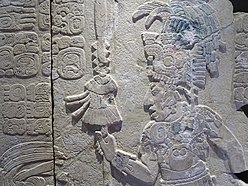
Back تاريخ المكسيك Arabic Historia de Méxicu AST Meksika tarixi Azerbaijani Гісторыя Мексікі Byelorussian মেক্সিকোর ইতিহাস Bengali/Bangla Istor Mec'hiko Breton Història de Mèxic Catalan Dějiny Mexika Czech Hanes Mecsico Welsh Mexicos historie Danish
| History of Mexico |
|---|
 |
| Timeline |
|
|

The history of Mexico spans more than three millennia, beginning with the early settlement over 13,000 years ago. Central and southern Mexico, known as Mesoamerica, saw the rise of complex civilizations that developed glyphic writing systems to record political histories and conquests. The Spanish conquest of the Aztec Empire in the early 16th century established New Spain, bringing Spanish rule, Christianity, and European influences.
Mexico gained independence from Spain in 1821, after a prolonged struggle marked by the Mexican War of Independence. The country faced numerous challenges in the 19th century, including regional conflicts, caudillo power struggles, the Mexican–American War, and foreign interventions like the French invasion. Efforts at modernization during La Reforma included promoting civil liberties and the separation of church and state, but the country was still beset by internal strife and external threats, including the Second Mexican Empire.
The late 19th-century Porfiriato era brought economic growth but also authoritarianism and social inequality, which eventually fueled the Mexican Revolution in 1910. The revolution led to significant social and political changes, with the emergence of the Institutional Revolutionary Party (PRI) as the dominant force. Throughout the 20th century, Mexico implemented land reforms, nationalized key industries, and expanded social welfare, but these achievements were marred by corruption, violence, and economic crises.
In the 1980s and 1990s, Mexico shifted towards privatization and trade liberalization, culminating in the signing of the North American Free Trade Agreement (NAFTA) in 1994. The turn of the century marked a significant shift in Mexico's political landscape, with the opposition National Action Party (PAN) winning the presidency in 2000, ending the PRI's long-standing dominance and ushering in a new era of Mexican politics. The 21st century has seen economic disparities, drug-related violence, and corruption. Administrations have focused on addressing these issues, with mixed success. The election of Andrés Manuel López Obrador in 2018 marked another significant shift, as his government has aimed to combat corruption, reduce inequality, and address the violence that has plagued the country for decades. Mexican history has been divided into three phases: Pre-Hispanic, Colonial, and Independent. Although such chronology may be Eurocentric, another general historical division has not been proposed [relevant?].[1]

